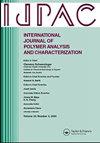Alkyd resins from Argemone mexicana seed oil: synthesis and characterization for use in anticorrosive coating applications
IF 1.6
4区 工程技术
Q4 POLYMER SCIENCE
International Journal of Polymer Analysis and Characterization
Pub Date : 2025-10-03
DOI:10.1080/1023666X.2025.2504559
引用次数: 0
Abstract
Argemone mexicana (AM) seed oil was extracted using petroleum ether as an effective solvent, with a yield of 20.345%. Alkyd resins derived from AM seed oil were synthesized by the alcoholysis-polyesterification method. By measuring the acid value at different times throughout the reaction, the reaction’s progress was investigated. The oil and resins underwent additional characterization using techniques such as GPC,1H NMR, FT-IR, and GC-MS to determine the molecular weight, structure, and fatty acid composition, respectively. Research was conducted to determine how the presence of maleic anhydride in the resins affected the wettability, anticorrosion, and curing characteristics of the resins and cured films. By mixing alkyd resin with epoxy resin and gradually raising the temperature from 60 °C to 210 °C, the alkyd resins were cured. For several days, alkyd resin-coated mild steel plates demonstrated effective corrosion resistance. The water contact angle (WCA) was measured to assess the wettability of cured films. Higher maleic anhydride content improved performance in paint and surface coatings. Synthetic alkyd resins from AM seed oil showed potential for salt-corrosion resistance, which can be used in marine vessel finishes.
墨西哥银总黄酮籽油醇酸树脂:用于防腐涂料的合成和表征
以石油醚为有效溶剂,提取银银酮(AM)籽油,得率为20.345%。以AM籽油为原料,采用醇解-聚合法制备醇酸树脂。通过测定反应过程中不同时间的酸值,考察反应过程。利用GPC、1H NMR、FT-IR和GC-MS等技术对油和树脂进行了额外的表征,分别确定了分子量、结构和脂肪酸组成。研究了树脂中马来酸酐的存在对树脂和固化膜的润湿性、防腐性能和固化特性的影响。将醇酸树脂与环氧树脂混合,温度从60℃逐渐升高到210℃,进行醇酸树脂固化。几天来,醇酸树脂涂层软钢板显示出有效的耐腐蚀性。通过测定水接触角(WCA)来评价固化膜的润湿性。较高的马来酸酐含量改善了油漆和表面涂料的性能。以AM籽油为原料合成的醇酸树脂具有良好的耐盐腐蚀性能,可用于船舶表面处理。
本文章由计算机程序翻译,如有差异,请以英文原文为准。
求助全文
约1分钟内获得全文
求助全文
来源期刊
CiteScore
3.50
自引率
5.30%
发文量
37
审稿时长
1.6 months
期刊介绍:
The scope of the journal is to publish original contributions and reviews on studies, methodologies, instrumentation, and applications involving the analysis and characterization of polymers and polymeric-based materials, including synthetic polymers, blends, composites, fibers, coatings, supramolecular structures, polysaccharides, and biopolymers. The Journal will accept papers and review articles on the following topics and research areas involving fundamental and applied studies of polymer analysis and characterization:
Characterization and analysis of new and existing polymers and polymeric-based materials.
Design and evaluation of analytical instrumentation and physical testing equipment.
Determination of molecular weight, size, conformation, branching, cross-linking, chemical structure, and sequence distribution.
Using separation, spectroscopic, and scattering techniques.
Surface characterization of polymeric materials.
Measurement of solution and bulk properties and behavior of polymers.
Studies involving structure-property-processing relationships, and polymer aging.
Analysis of oligomeric materials.
Analysis of polymer additives and decomposition products.

 求助内容:
求助内容: 应助结果提醒方式:
应助结果提醒方式:


